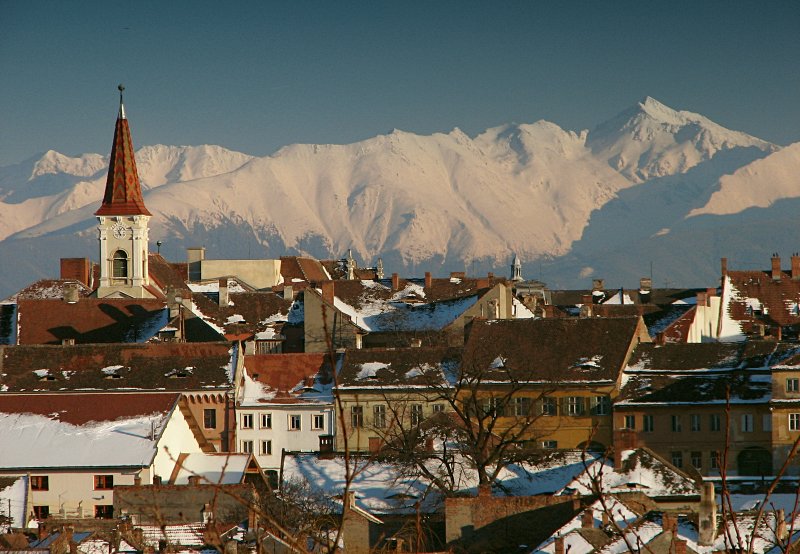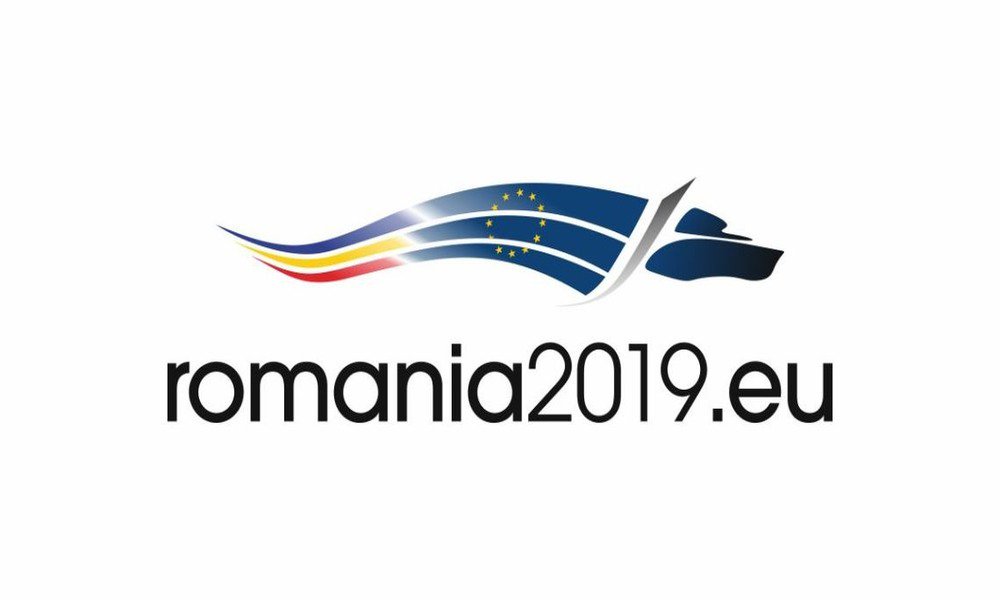Sibiu, the European Capital of Culture in 2007 and city of the informal European Council on 9 May 2019 ->

|
The human remains found in "The Cave with Bones", radiocarbon dated as being from circa 40,000 years ago, represent the oldest known Homo sapiens in Europe. The Neolithic-Age Cucuteni area in northeastern Romania was the western region of the earliest European civilization, known as the Cucuteni-Trypillian culture. Also the earliest known salt works in the world is at Poiana Slatinei, near the village of Lunca in Romania; it was first used in the early Neolithic, around 6050 BC, by the Starčevo culture, and later by the Cucuteni-Trypillian culture in the Pre-Cucuteni period. Evidence from this and other sites indicates that the Cucuteni-Trypillian culture extracted salt from salt-laden spring water through the process of briquetage.
Sibiu, the European Capital of Culture in 2007 and city of the informal European Council on 9 May 2019 -> |
 |
Prior to the Roman conquest of Dacia, the territories between the Danube and Dniester rivers were inhabited by various Thracian peoples, including the Dacians and the Getae. Herodotus, in his work "Histories", notes the religious difference between the Getae and other Thracians, however, according to Strabo, the Dacians and the Getae spoke the same language. Dio Cassius draws attention to the cultural similarities between the two people. There is a scholarly dispute whether the Dacians and the Getae were the same people. |
|
|
In the unique set-up of the European Union institutional structure, the Council of the European Union is the institution where the governments of the EU member States defend their own country’s national interests in the negotiation of the legislative and non-legislative files. The Council of the European Union is one of the seven institutions created by the European Union Treaties and, together with the European Parliament and the European Commission, it is involved in the drafting of the European legislation. While the other EU institutions are chaired by Presidents with multi-annual mandates, the Council of the European Union doesn’t have a permanent, single-person president and its Presidency rotates every 6 months. Every EU Member State has the obligation to hold in turn the Council Presidency and chair the its meetings at the ministerial, diplomatic and expert level.
PM of Romania, V. Dăncilă speeched 21 March 2019 during an event taking place in a decisive moment from the perspective of at least three major political processes currently unfolding at European level: elections for the European Parliament, and later, transition to a new legislative and institutional cycle; Brexit and the developments generated by this process, yet marked by many uncertainties, as well as the reflection process on the future of the European project. |

|
There are ongoing talks on essential aspects for the Union – such as the post -2019 strategic Agenda, strengthening the Economic and Monetary Union, and the negotiations on the Multiannual Financial Framework. Thus, the Romanian Presidency of the EU Council has the chance to mark the reflection process on EU’s future, through the Summit to be hosted in Sibiu, considering that the only credible response to current questions on the future European architecture consists in strengthening the European project. I think that we should advocate a stronger, more effective Union, that although marked by Brexit, has the capacity to stand up and be confident following this challenge.
Let us advocate for a Union of reaffirmed common trust, for restoring the the European citizens’s trust in the transforming force of the European project, for trust in the EU’s capacity to provide citizens with a secure environment, a dignified one for living, a prosperous and ambitious future, for trust in EU’s capacity to regain control on its own destiny, and to promote an effective and genuine leadership whose legitimacy derives from the aspirations and backing of European citizens, based on the real agenda of the citizens. |
We see in the European Union a guarantor of democracy, security, peace, well-being and progress.
This is the raison d'être of the European project, which has not lost its relevance for the Member States and European citizens over time, and which we have to keep in mind in order to restore our confidence in today's Union. The European Union is the "guardian" of the European model of life, which, by its force of attraction, continues to represent, globally, our most valuable asset, and which, through its transforming force, has initiated major structural changes in the Member States, in the aspiring states, in the neighborhood, but also in remote parts of the world. On the other hand, the European Union has faced in recent years a series of imbalances that have led to weakening people's trust in the European project and in its ability and in our ability to find the best solutions for prosperity, security and social justice. Among these imbalances, the migration crisis played a major role, generating tensions at European level, which in turn led to the development of xenophobic trends, euroscepticism, populism, and radical political trends. I would like to also mention the issue of the deficit of trust, considered against the background of the external interference phenomenon in our electoral processes unfolding, both European and at the level of the Member States, as well as in the context of increased propagation of fake news and disinformation. |
Romania, as Presidency-in-Office of the Council of the European Union, has made efforts since the first days of mandate to combat this challenge, which has been intensively debated in all European institutions.
As a result of these efforts, the General Affairs Council succeeded in adopting important conclusions on ensuring free and fair elections, with a focus on combating disinformation. In order to build citizens' trust in the European Union, we need to create an European area of genuine communication, free of any interference. At present, we are all convinced that the European project needs a new impetus, vision of the future, based on this common vision of long-term solutions. Romania, as the Presidency-in-Office of the Council of the European Union, has the responsibility but also the chance to actively participate in formulating this vision of EU future. The debate on EU’s future is an opportunity to enhance European inclusion and cohesion, in order that all member states may find themselves in this construction. A solid construction for a future Europe should besides the principle of cohesion, offer the possibility of expressing individual diversity and specificity, which, brought together, should create a harmonious, homogenous and coherent project. |
The accepted meaning of the cohesion concept was transposed in a transversal manner within our thematic priorities. It also reflects in our perception on the global role of the European Union.
The continuation of the enlargement policy, observance of EU commitments in its southern and eastern neighborhoods, promotion of the multilateral system based on rules, maintaining a solid transatlantic partnership are in Romania’s view, central elements for designing a better future for Europe. Ladies and gentlemen, As we are at the end of the legislative cycle, we plan in the first part of the mandate of our presidency, to focus on advancing the current European agenda, especially on legislative drafts that are almost completed or in an advanced negotiation stage at the level of the Council or the European Parliament. Since the start of the presidency, we have managed alongside the other member states and in cooperation with the other European institutions, to conclude the negotiations on 81 legislative dossiers, many of them with major impact at European level, with impact on the life of the citizens. I would only mention some of them, respectively in the energy field: Natural Gas Directive, in the field of the single market: The Directive on Copyright in the Digital Single Market, in the labor field- Regulation establishing a European Labour Authority. |
Significant results have also been achieved in the banking area: respectively the Banking Package, the Legislative Package on the Capital Markets Union, in the IT area: the regulation package on the interoperability of the EU’s information systems, in the political area: amendments to the legislation on the status and funding of political parties and foundations; Council’s conclusions on ensuring free and fair elections with a focus on combating disinformation, and also in the field of research and innovation, - the Council’s conclusions on artificial intelligence. Through the efforts made and the results achieved so far, we can demonstrate that our presidency is a presidency of efficiency and quality which, in close collaboration with the other member states and with all European institutions, delivers in a consensual manner, the awaited results, desired and useful results for the member states, the citizens and the business environment. The confidence in such concrete results, achieved in a manner designed to unite us at European level, represents a solid ground on which to build the path to Sibiu (Summit)agenda which would lead us to a better Europe in the future, closer to its citizens. I hope that today’s debate, your opinions, recommendations are found in the project of the European future. I would like to thank you and wish you greater success on today’s discussions! |
In consultation, every Presidency sets its priorities. Romania's priorities are:
|